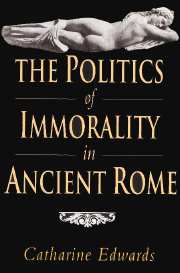Book contents
- Frontmatter
- Contents
- Preface
- Introduction
- 1 A moral revolution? The law against adultery
- 2 Mollitia: reading the body
- 3 Playing Romans: representations of actors and the theatre
- 4 Structures of immorality: rhetoric, building and social hierarchy
- 5 Prodigal Pleasures
- Bibliography
- Index locorum
- Index of subjects and proper names
5 - Prodigal Pleasures
Published online by Cambridge University Press: 23 September 2009
- Frontmatter
- Contents
- Preface
- Introduction
- 1 A moral revolution? The law against adultery
- 2 Mollitia: reading the body
- 3 Playing Romans: representations of actors and the theatre
- 4 Structures of immorality: rhetoric, building and social hierarchy
- 5 Prodigal Pleasures
- Bibliography
- Index locorum
- Index of subjects and proper names
Summary
Pleasure was a problem for members of the Roman elite – or so moralists felt. In his treatise on the good life, Seneca stresses the insidious threat posed by the attractions of sensual pleasure, while asserting that only the subhuman will want to surrender themselves completely:
nam quod ad voluptatem pertinet, licet circumfundatur undique et per omnis vias influat animumque blandimentis suis leniat aliaque ex aliis admoveat, quibus totos partesque nostri sollicitet, quis mortalium cui ullum superest hominis vestigium, per diem noctemque titillari velit et deserto animo corpori operam dare?
As far as regards sensual pleasure, though it flows around us on every side and seeps through every opening, though it softens the mind with its charms and leaves no avenue untried in its attempts to seduce us in whole or in part, what mortal who has any claim to be a member of the human race, would choose to have his senses aroused day and night, abandoning the spirit to devote all attention to the body?
(Sen. De vita beata 5.4)Seneca's language presents pleasure as fluid, both engulfing and invading its hapless victims. His insistence on its seductive dangers could be read as betraying a certain fascination with pleasure.
- Type
- Chapter
- Information
- The Politics of Immorality in Ancient Rome , pp. 173 - 206Publisher: Cambridge University PressPrint publication year: 1993

